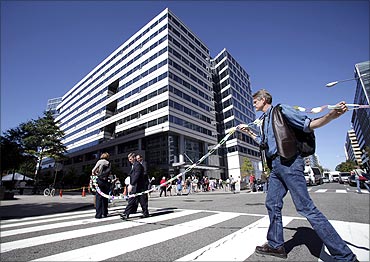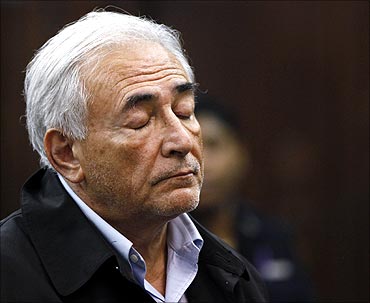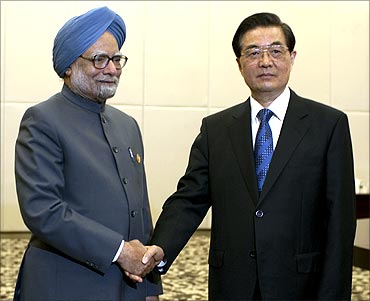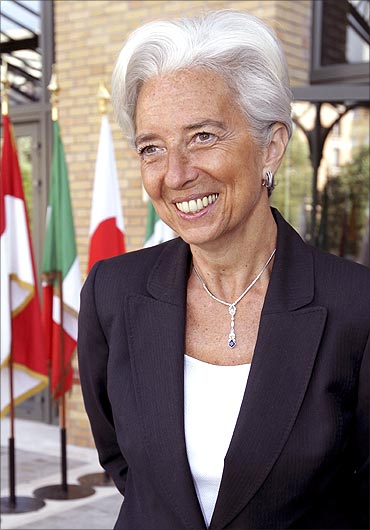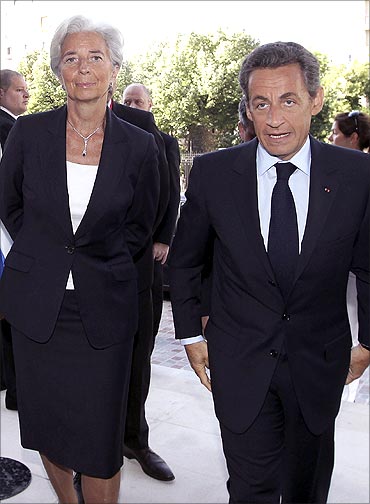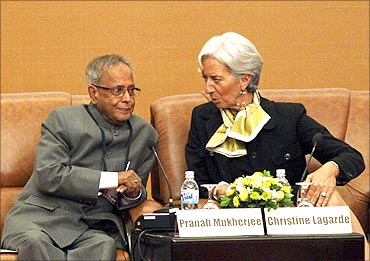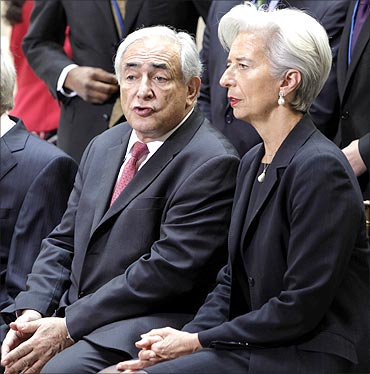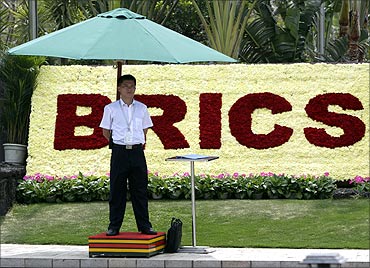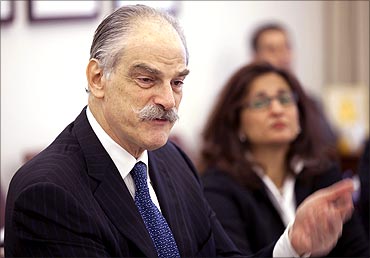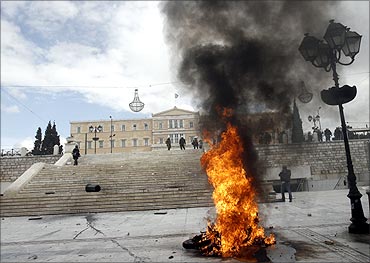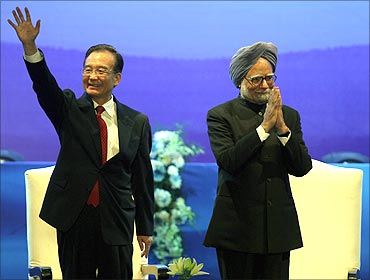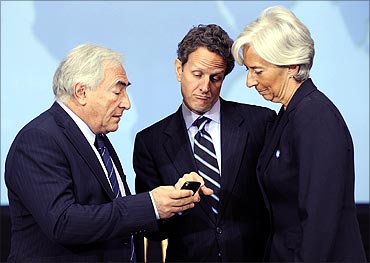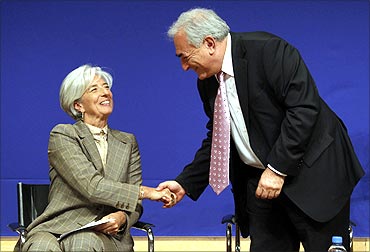 | « Back to article | Print this article |
All about the war over IMF chief's post
The scramble for International Monetary Fund managing director's chair has escalated into a war of sorts with developing nations calling for a change in the power equation.
Most of the developing nations seek an end to European dominance over the IMF's top job. Prime Minister Manmohan Singh on Wednesday said the developing countries should be together in the attempt to reform the global financial institutions.
"I am not very well informed on what is going on with regard to managing director of IMF but I do recognise that the struggle for transformation of global institutions, including Bretton Woods, is not a one shot operation. It is a long process in which all developing countries have to stand united," Prime Minister Manmohan Singh said.
Indeed, only a united group of developing nations can pressurise the global fraternity to select the best and most suitable candidate for the coveted job.
Click NEXT to read on
All about the war over IMF chief's post
Although some European nations have declared their support for French Finance Minister Christine Lagarde, the BRICS nations -- Brazil, Russia, India, China and South Africa -- have issued a joint statement in Washington questioning the methodology of selection of IMF chief on the basis of nationality.
"We believe that, if the Fund is to have credibility and legitimacy, its managing director should be selected after broad consultation with the membership," BRICS said.
Click NEXT to read on
All about the war over IMF chief's post
BRICS said it is time to 'abandon the obsolete unwritten convention that requires that the head of the IMF be necessarily from Europe'.
Meanwhile, unconfirmed news reports said that the European Union has offered the post of the deputy managing director of the IMF to a Chinese candidate in exchange for its support to Christine Lagarde.
Amid dissenting voices raised by developing nations over a European holding top IMF post, French finance minister Christine Lagarde is planning to visit India, China and Brazil to drum up support for her bid to become the chief of the global lender.
Lagarde, said that she was prepared to visit China, India and Brazil to muster broad support and not just the backing from Europe.
"China, Brazil and India are an absolute necessity...," she told the Wall Street Journal.Click NEXT to read on
All about the war over IMF chief's post
"I have decided to present my candidacy for the job. This decision was made after mature reflection. And I have a perfectly clear conscience about that affair," Christine Lagarde said.
The 55-year-old Lagarde, was earlier France's Minister of Agriculture and Fishing and Minister of Trade. Lagarde is the first woman ever to become minister of Economic Affairs of a G8 economy.
A noted lawyer, Lagarde made history as the first female chair of the international law firm Baker & McKenzie. The Financial Times ranked her the best minister of Finance of the Eurozone in 2009.
Lagarde was ranked the 17th most powerful woman in the world by Forbes magazine in 2009.
Interestingly, women workers at IMF have been complaining about the male culture at the IMF and they now want a woman to as their top boss.
Click NEXT to read on
All about the war over IMF chief's post
France's President Nicolas Sarkozy has said that she is supported by several countries.
With a strong contender Turkish economy minister Kema Dervis backing out of the race, her chances have become stronger.
The Organisation for Economic Co-operation and Development (OECD) has also supported Lagarde with its chief, Angel Gurria saying Lagarde meets all the criteria to be the IMF chief.
US Treasury Secretary Timothy Geithner said Lagarde has an excellent mix of economic and political skills.
She helped France tide over its worst recession much better than other nations.Click NEXT to read on
All about the war over IMF chief's post
The EU bloc leaders suggest that only a European chief can understand the region and manage the financial crisis in countries like Greece, Ireland and Portugal which are indebted to the IMF.
As France's trade minister between 2005 and May 2007, Lagarde focused on opening new markets for the country's products, focusing on the technology sector.
Click NEXT to read on
All about the war over IMF chief's post
It is alleged that Largarde intervened in a dispute between the Tapie and Credit Lyonnais bank and offered this huge sum as compensation.
The decision on whether Lagarde would be prosecuted will be known in June. This could affect her chances of winning the top job at IMF.
Even as the developed world supports her candidature, opposition parties have upped their ante against Largarde whom they accuse of misusing public funds.
Click NEXT to read on
All about the war over IMF chief's post
Experts say a change of guard, especially a candidate from developing counties, can boost economic ties between developing nations and the developed world.
The person can play a decisive role in representing the developing countries. It can also solve major problems in small nations and extend more financial assistance in times of need.
Click NEXT to read on
All about the war over IMF chief's post
As part of its efforts to support countries during the global economic crisis, the IMF is beefing up its lending capacity.
It has approved a major overhaul of how it lends money by offering higher amounts and tailoring loan terms to countries' varying strengths and circumstances.
Click NEXT to read on
All about the war over IMF chief's post
The IMF has already granted more than $280 billion to crisis-hit countries like Greece, Ireland, Portugal, Romania, and Ukraine.
The IMF is also stepping up its lending to low-income countries to help prevent the crisis undermining recent economic gains and keep poverty reduction efforts on track.
However, developing nations feel that reforms can be taken forward only by individuals with the right experience and exposure in handling crises.
Pressing for reforms, the BRICS statement said that the multilateral institution should reflect the growing role of developing countries in the world economy.
Click NEXT to read on
All about the war over IMF chief's post
"We have to recognise that international relations are power relations and those in power do not wish to yield ground easily," Manmohan Singh said.
Meanwhile, Timothy Geithner said the selection of the new president of IMF should be open and transparent.
Click NEXT to read on
All about the war over IMF chief's post
Adding that the person must have an outstanding professional background, Geithner said French Finance Minister Christine Lagarde and Mexico's central bank governor Agustin Carstens are best candidates for the job.
Former United Kingdom Prime Minister Gordon Brown is also in the fray. Interestingly, since the beginning, the IMF has been led by a European, the World Bank by an American.
Click NEXT to read on
All about the war over IMF chief's post
The IMF said the candidate needs a high-level economic policy-making has a record of excellence, with outstanding professional background and management of leading global organisations and diplomatic skills.
US Treasury Secretary Timothy Geithner said in a statement that the United States to support the candidate should have "the necessary depth of experience and leadership, while the IMF members to win broad support."
Click NEXT to read on
All about the war over IMF chief's post
The fact that Europe has the highest percent of the votes is a deciding factor. Countries hold just over 30 per cent of the votes while the United States has 16.7 per cent votes.
Japan and Canada have 6 per cent and 3 per cent of the voting rights. Developing nations have a right over 44.7 per cent of the votes.
Click NEXT to read on
All about the war over IMF chief's post
This may not be an easy win for Europe this time as IMF boss must get 85 per cent of the votes.
Experts say developing countries will stand a chance if they agree on a single candidate than recommending individuals from their own respective countries.
However, BRICS nations still have their own candidates and are yet to arrive at a consensus
